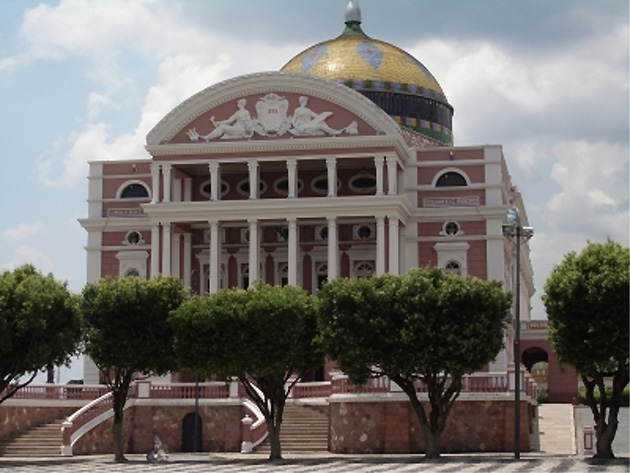Opinion
FootballEngland face trip to embrace marvellous madness of Manaus
:focal(154x147:156x145)/origin-imgresizer.eurosport.com/2015/03/26/1443764-30872247-310-310.jpg)
Published 06/05/2015 at 16:11 GMT
It's 11pm on a sweltering night in August, 1995. I'm sitting on the deck of a belching, rust-ridden cargo boat chugging its way up one of the main tributaries of the Amazon river, when a beer-fuelled game of dominoes is interrupted by a moth the size of a dinner plate landing on the table.
Eurosport
Image credit: Eurosport
First instinct, having grown up in the wilds of Croydon, is to leap away and scream like a pre-teen girl at a One Direction concert. But one of the grizzled locals simple flicks at the hideous beast with the base of his bottle of Brahma, and it flies off into the night.
The next morning, the boat docks at Manaus.
It's one of the strangest big cities in the world: modern and progressive in many ways, but cut off from the rest of civilisation by literally thousands of miles of almost untouched jungle. Few who live here can afford the air fare to the rest of Brazil - at least, not on a regular basis - which means that those riverboats endlessly plying thousands of miles of Amazonian tributaries are more or less the only viable means of transport for normal people. There are no roads, no trains, no long-distance coaches. Just miles and miles of river, a throwback which lends an almost medieval sense of isolation to a city that's always had big dreams. Travel here doesn't take hours; it takes days, or sometimes weeks, to get from A to B.
The arrival of the World Cup is far from the first of those dreams, nor is it even vaguely close to being the grandest. In the late 19th century a local politician named Antonio Jose Fernandes Junior suggested that the town made rich by the rubber trade could build an opera house to rival those in Paris and Milan, and on New Year's Eve in 1896 the Teatro Amazonas was opened, one of the grandest and most beautiful theatres in the world - in one of the least likely locations.
This is a city that takes the bizarre and surreal in its stride, not even pausing to consider the intrinsic oddness of its unique location and history. So when England kick off their World Cup against Italy in the middle of the night, it will be business as usual.

England feared being one of the few sides to play in Manaus, and with good reason: the humidity is oppressive, 24 hours a day, and there are sure to be plenty of surprises in store in the hotels, restaurants and training pitches for Roy Hodgson and his squad of pampered millionaires. On top of that is its sheer isolation: it's rather like a football tournament being hosted in Spain, but with England told to go to the Shetlands to play their opening group stage match. They simply won't feel part of the tournament until the second match in Sao Paulo.
The good news for England is that their opponents for their opening World Cup match on June 14th next year will be equally baffled by their surroundings: Brazilians from the mega-cities of Rio and Sao Paulo feel completely lost in Manaus, so the Italian players will be just as unsettled as England's players. The fact that the game kicks off at 9pm local time - 10pm in the rest of Brazil, and a ludicrous 2am British time - will make the entire spectacle all the more surreal for all involved.
Yet in many ways, it could turn out to be the best possible way to enter the tournament, since coming to terms with the deceptively wide chasm that separates South American culture and life from that in Western Europe is essential for any side hoping to do well at a World Cup. Pretending that things are the same as they are at home might seem a decent idea for a World Cup in Germany, but it simply won't work in Brazil - so the best option is confronting and embracing the inevitable culture shock from the start. Being forced to do so by being parachuted into one of the globe's strangest cities seems as good a way as any to do that.
South America's greatest novelists - most famously Gabriel Garcia Marquez in 100 Years of Solitude - have often been described by European and North American critics as writing 'Magical Realism'. It's a label they reject: in a land where the existence of ghosts is taken for granted, and educated professionals still visit the shaman before they try the GP, it's simply normal life in South America.
And maybe there's a lesson in that for England. After a successful but underwhelming qualifying campaign, no serious commentator gives them any hope of progressing far in the tournament next year. But England's team will see life a little differently after their trip to the little-known heart of Brazil; things will seem normal that might before have seemed impossible. And if they manage to take that spirit with them, who knows what they might end up doing by the time their World Cup campaign comes to an end?
Toby Keel
Scan me
Related Topics
Share this article
Advertisement
Advertisement